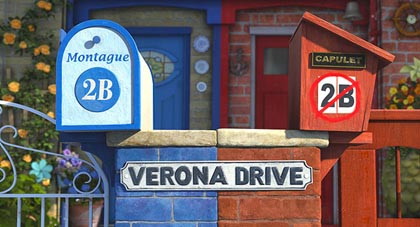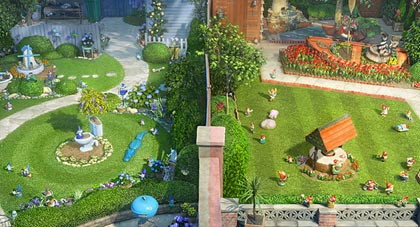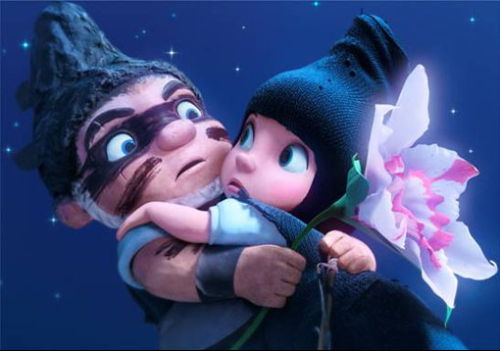
February 24, 2011, by Peter Kirwan
Gnomeo and Juliet (Rocket Productions) @ Showcase Cinema, Coventry
Writing about web page http://www.imdb.com/title/tt0377981/
Film versions of Shakespeare are required, one way or another, to confront the docu-real potentiality of the medium in the transition from stage to screen. While a very few choose to exploit the possibilities for historical drama and lush scenography, the heightened language and inevitable familiarity of subject matter more often lead to a self-conscious awareness of the medium, which can be used to great effect (as in Julie Taymor’s Titus, Luhrmann’s Romeo + Juliet et al.). Kelly Asbury’s Gnomeo and Juliet fell into the latter camp. Rather than throw viewers directly into the world of the play, the film drew attention to its own inherent performativity and, indeed, theatricality, beginning with a red curtain and the sound of an orchestra tuning up. The Prologue entered to address the audience in modern dialogue, pointing out that the play we are about to see has been performed. A lot. Warning us that the Prologue itself is long and boring, he began to read from an epic scroll, pausing only to glare at the stage hooks protruding from the wings. Finally secure, he continued with the Prologue, until a trapdoor opens and swallowed him whole. Gnomeo and Juliet began.
Okay, I’m clearly having some fun. This was, after all, a computer animated children’s film about garden gnomes, with a loose nod to Shakespeare. It was also produced by Elton John, who provided the soundtrack – thus, drag races were conducted to Saturday Night’s Alright For Fighting; a date-preparation montage (with cute 80s stylisations) was underscored with Don’t Go Breaking My Heart; and Stephen Merchant’s gawky artist Paris transmuted into John himself as he serenaded Juliet with Your Song.
Asbury’s film transplanted the action to a Stratford-upon-Avon back yard, split between house 2B and a house that is emphatically not ‘2B’, owned by the elderly Miss Montague (Julie Walters) and Mr. Capulet (Richard Wilson, in a clear nod to his One Foot in the Grave role) respectively. This bickering couple insulted each other cordially over the garden fence, before leaving for the day in their Minis, honking furiously at one another. Once gone, their garden ornaments came to life in a playful feud over gardening (both gardens grew appropriately hued flowers) which escalated as the film went on – competitive lawnmower races, late night graffiti raids, then later all out carnage.
Against this were set James McAvoy’s Gnomeo and Emily Blunt’s Juliet. Gnomeo, the only child of Lady Bluebury (Maggie Smith, who spoke reverently of her husband "May he rest in pieces") was the golden boy of the Blues, the champion drag-racer and fun-lover. Juliet, meanwhile, was overprotected by her father (the unmistakable Michael Caine) who kept her in a stone fairy castle where she tended flowers. Her ongoing protestation was against being treated as "delicate" and mewed up – and the extremely effective CG-rendering of the ceramic characters made their fragility a real threat. Juliet’s ninja and kung-fu skills, as well as her easy command of power motors, belied the protectiveness of her father; but, in a surprisingly intelligent reading of the play’s situation, the father remained oblivious of her own strength and ultimately resulted to literally gluing her to her castle prison. Retaining her own independent strength while being restrained by implacable forces, the character’s entrapment actually served as an effective translation of the text.
Elsewhere, very little of Shakespeare’s play was retained. Even "Gnomeo, Gnomeo" was paraphrased in modern language, rather than crowbarring in recognisable Shakespearean dialogue, allowing for a far more consistent text for children. There were neat references for the grown-ups though – Lady Blueberry’s cry of "Let slip the dogs of war" was followed by a group of cute stone rabbits appearing in war paint; an angry bulldog was pushed out of the yard with cries of "Out, out" before an offscreen owner shouted "Damn Spot!"; and Gnomeo was ejected from the garden to placations of "Goodnight, sweet prince". The play’s setting allowed the film to more explicitly position itself in relation to Shakespeare, however – after Gnomeo was carried off by a dog through the streets of Stratford (I recognised Church Street!), he found himself by Shakespeare’s statue. Relating his story to the Bard (Patrick Stewart), Bill countered that the story sounded somewhat familiar, before warning Gnomeo that it would all end in tragedy. This Shakespeare was impersonal however; wrapped up in his own narcissistic love for tragedy, the statue became animated as he imagined the sounds of applause, curtain, and cries for "Author! Author!" at the expense of the angry Gnomeo’s feelings.

There was plenty more for the grown-ups too, from the thong-wearing Italian gnome to the gentle double-entendres. I enjoyed picking up on the film in-jokes: obvious visual references to American Beauty (Ashley Jensen’s Nanette, a fountain-frog in the Nurse’s role, writhing in a bed of roses as Paris’s song wooed her) and Grease (an utterly appalling climactic dance sequence, to a hideous remix of Crocodile Rock) were complemented by far more subtle references: one conjoined gnome turned to his partner and said "I wish I could quit you" (Brokeback Mountain); a plastic flamingo re-affixed his leg while saying "One word – Plastic!" (The Graduate); and an underwater sequence following Gnomeo across the bottom of a pond as projectiles whizzed past was a direct steal from the Omaha Beach sequence of Saving Private Ryan. Anyone catch any more?
The simple rewriting of the plot saw Juliet don ninja garb to go and steal a flower from the nearly abandoned Laurence garden, where Gnomeo had fled after a late night graffiti attack on the Red garden in vengeance for his earlier drag race defeat at the hands of the cheating Tybalt (a spectacularly and unambiguously evil Jason Statham). The two met on a greenhouse and immediately engaged in a playful courtship. While on a later date in the garden, they freed the plastic flamingo Featherstone (Jim Cummings, in a very rough approximation of the Friar Laurence role) from a garden shed. As the garden pranks got out of hand, however, Tybalt arranged for the Blues’ prize flowers to be cut down. Ordered to take revenge, Gnomeo was caught in the Red garden by Juliet. Featherstone soothed them in his garden by telling his own back story, in which his human owners broke up, resulting in his partner flamingo being packed into a removal fun – other people’s hate destroyed his love (an attempt at Toy Story levels of pathos which didn’t really manage it, but simple enough). The pink flamingo, fittingly, brought Red and Blue back together, and they agreed to grow a garden together away from their families.
They were caught kissing by Benny (the wonderful Matt Lucas), who ran back across the alleyway towards his own house but was caught by Tybalt, who was waiting for him on his power-mower. Tybalt smashed Benny’s hat and threatened to mow down the gnome himself; but Gnomeo gave chase and caused Tybalt to crash his mower and smash into bits (a surprisingly sudden moment of death for a kids film, disappointingly mitigated in the final dance as he reappeared glued together). Gnomeo was chased away, despite Juliet announcing her love for him to her appalled father, and he appeared to be run over by a truck. Juliet was glued to her castle in punishment, while Gnomeo made his pilgrimage to Shakespeare and back again.
Benny became prominent, however, as his vengeance took over. Stealing the old lady’s credit card details (to the sounds of Bennie and the Jets, hysterically), he ordered the ultimate mower online – the Terrafirminator, whose advert (voiced by Hulk Hogan) was the absolute comic standout of the film, and should be immediately viewed here. Yet the promised machine went out of control and tore up both gardens, and Gnomeo arrived just in time to offer to die with the imprisoned Juliet. Handily, this being an animated cartoon, everyone survived, although the fate of the lovers was kept hidden long enough for the opposing families to reconcile.

As a run through of the basic plot, it was simple and entertaining, and supported by an eccentric cast of oddities (a Herculean garden gnome; the war rabbits; a fawn voiced by Ozzy Osbourne who served no discernable purpose whatsoever; and a voiceless mushroom called Shroom who followed Gnomeo around. The film’s most obvious omission was a Mercutio figure; but by changing the rivalry to a friendly one that descended into one-upmanship, his purpose as a catalyst was no longer needed. The "death" of Tybalt, and the fragility of the gnomes themselves, gave enough of a sense of peril, particularly as the gardens were torn to shreds (this may have been more effective in 3D) to ram home the film’s basic message – love is preferable to hate. It’s reductive, but then it’s also a perfectly justifiable moral to draw for kids from the text.
There’s an important place for films like this, which don’t aim to introduce kids to Shakespeare and don’t try to do something worthy with the text. It’s a simple use of recognisable names and tropes to sell a frothy animation that will undoubtedly do great business at the box office. And yet, there was enough wit and intelligence in the script (by, among others, Bunny Suicides legend Andy Riley) to make it a fun evening. Accusations of it bastardising Shakespeare that are circulating the internet seem to miss the point – it’s hardly competing with the RSC, and it was fun to see an appropriation of Shakespeare for kids that was neither patronising nor compromised by fruitless gestures towards textual fidelity. As the Terrafirminator blew up, the distant statue of Shakespeare smugly muttered "Told you so", before the film gleefully revived its leads under the neon lights of a Club Tropicana water feature. This wasn’t smug art, but it was good, clean fun.
No comments yet, fill out a comment to be the first

Leave a Reply